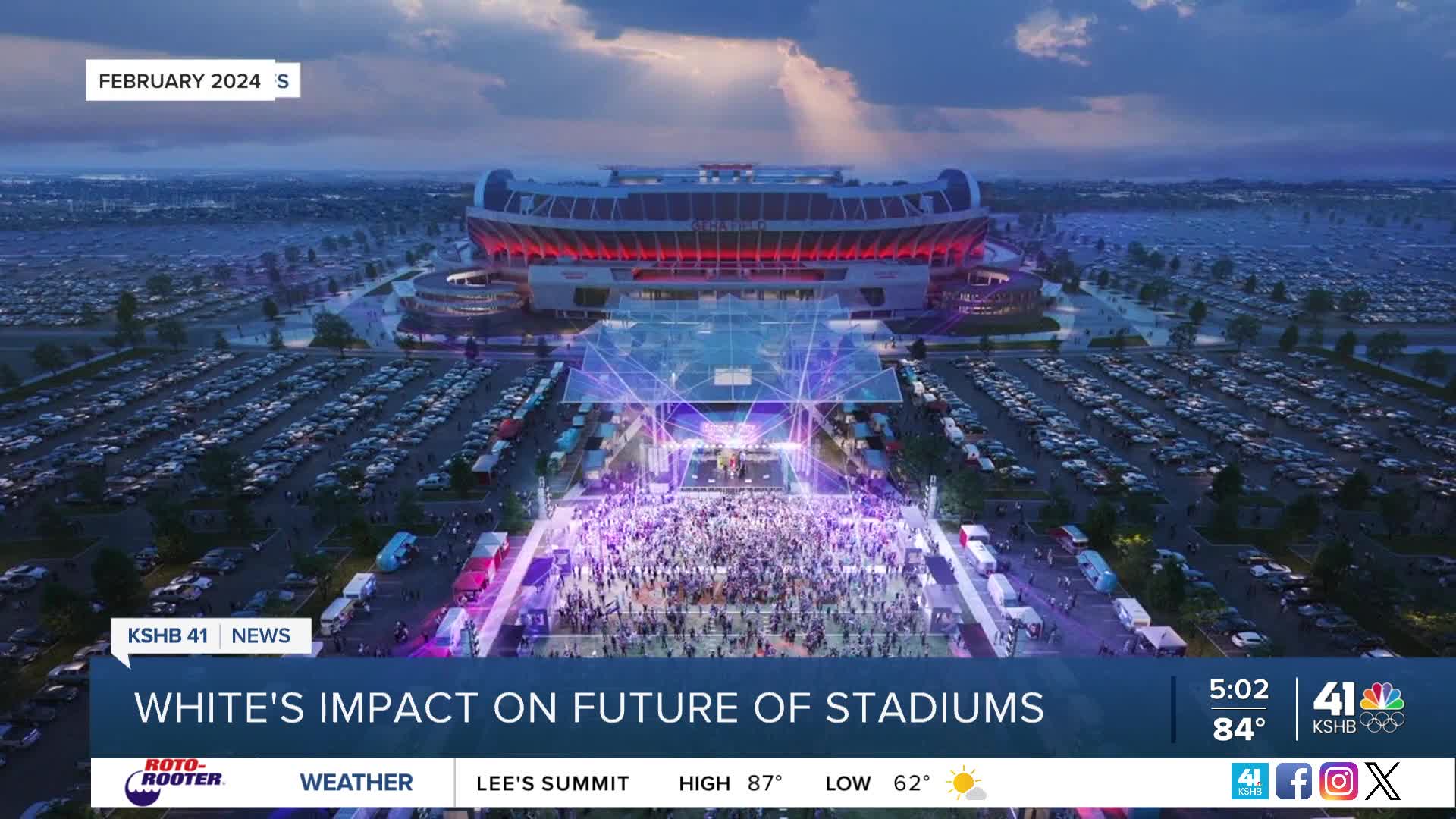KSHB 41 reporter Tod Palmer covers sports business and eastern Jackson County. Share your story idea with Tod.
—
With Frank White Jr.’s days as Jackson County executive numbered, his successor — whoever that might be — faces a tight deadline to try and keep the Chiefs and Royals in the county.
The years-long saga about where the teams will play in the future is expected to be settled within the next nine months.
RELATED | KC sports fans fed up over saga swirling around Chiefs, Royals stadiums
White was a vocal critic of the April 2024 push to extend a 3/8-cent sales tax to renovate GEHA Field at Arrowhead Stadium and build a new downtown baseball stadium.
“The current deal is just not a good deal for Jackson County,” White said in February 2024 when the Chiefs unveiled their renovation plan.
He fought for and won several concessions from the teams — on property insurance payments, demolition costs and a robust community benefits agreement — but he never endorsed the plan, because the teams had yet to sign a tentative lease agreement or substantively changed the funding formula.
“Our goal was to try to bring some revenue back to the county from this partnership, and make it a more equitable partnership with the county and the teams,” he said ahead of the vote. “That's the part that's missing.”
Voters largely agreed, rejecting the plan with 58% of the vote and some remain grateful.
“I’m glad he kind of stood up to the Royals,” Gary Paredes, a resident of Kansas City, Missouri, said.
Several Royals fans who went to the polls Tuesday, when 85% of Jackson County voters chose to recall White, blamed the team as much as the county’s top elected official.
“The Royals did such a terrible job,” Sandra Handley, a KCMO resident, said. “I mean, they've got all the money in the world to spend, and they still couldn't get a message out anybody can understand.”
Royals Chairman and CEO John Sherman promised a transparent process, but voters don’t believe he delivered.
“I think the people felt, or at least I felt, that most of the stadium discussion and negotiations were not really public,” Thomas J. Winter said outside the Second Presbyterian Church polling location in Brookside. “The team is a public asset, and I think people just want to be heard about that. I think they want the team to be recognized, not as a business, but as a civic entity.”
It hasn’t gotten better in the 18 months since voters rejected a proposal that included a new stadium in the northeast corner of the Crossroads Arts District.
The Royals haven’t put forth a new plan after the Crossroads plan flopped at the polls. The club has denied multiple requests, including several in recent weeks as the 2025 Royals season came to an end, to speak with Sherman or other club officials for an update.
“I would like to see everybody talking publicly about what the options really are, because I don't think, as a voter, we know much of anything other than rumors, and we don't even have very good rumors,” Handley said. “I'd like to see some open discussion about this and some explanation of what's happening and what the choices really are. ... I'd like to hear from somebody with the Royals about what they're thinking and where they're going with this.”
The Kansas legislature initially passed changes to its STAR Bonds incentive tool in June 2024, increasing the percentage of a project’s total cost that the state will redirect from 50% to 70% for a sports stadium.
When the Legislative Coordinating Committee extended the STAR Bonds offer for another year in July 2025, it added a requirement to present proposals by the end of the year.
In response, Missouri passed Senate Bill 3 in June 2025, which provides a similar funding mechanism to STAR Bonds. Both allow tax revenue generated from a project to be redirected toward construction and maintenance costs.
No matter how it shakes out now, the teams stand to receive a larger windfall from taxpayers, whether it’s in Kansas or Missouri, than they would have in April 2024.
“I knew we were going to get screwed over if we didn't vote for that, and we have,” Handley said.
The Missouri legislature’s proposal requires a local financing component, which means voters in Jackson County — or potentially Clay County — will be asked to extend or pass a sales tax to fund the stadiums, possibly as soon as April 2026.
“There is so much bad feeling already about this, it's going to be hard to pass the legislation they need, just because everybody is sort of angry and feels left out and unheard,” Handley said.
The Chiefs’ choice is pretty clear — renovate Arrowhead using money from a sales-tax extension or build a new (probably enclosed) stadium, which would cost at least $1.5 billion in Wyandotte County.
Meanwhile, the Royals reportedly are considering sites in KCMO, North Kansas City and Overland Park.
“I personally don't care that much about the Chiefs one way or another,” Handley said. “But I care about the Royals, and I'm so sorry this has gotten so messed up. I think the owner is a good person, but it's all so messed up.”
Mayor Quinton Lucas said KCMO remains committed to keeping both teams in the city.
"I’ve been bullish all along that the Chiefs and the Royals are staying in Kansas City, Missouri," he said. "... Our conversations never ended, our discussions never ended, and we look forward to working with the next county executive to make sure there is a good, fair deal for our taxpayers, but also one that keeps the teams right here in Kansas City MO."
White sued last week, preemptively hoping to prevent the election results from being certified. The Missouri Supreme Court denied White a hearing Wednesday.
—





